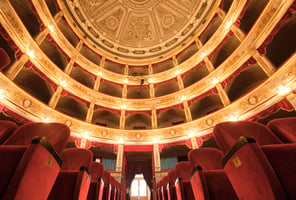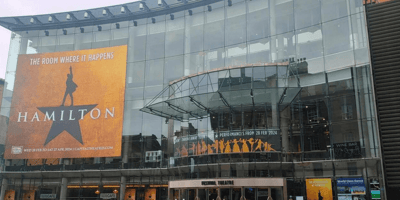On Wednesday 7th March, Jeremy Hunt took to the despatch box to deliver the Spring Budget. With...
Access To The Arts: Top UK Theatre Initiatives To Make Theatre Accessible For Children
%20Lyric%20Hammersmith%20Theatre%20(1200%20x%20400%20px).png?width=1160&height=387&name=(C)%20Lyric%20Hammersmith%20Theatre%20(1200%20x%20400%20px).png)
Theatres play a crucial role in connecting communities with the arts. With the power to inspire, educate and unite people across various backgrounds, performance art can drive cultural narratives and perspectives, break down socio-economic barriers and fuel creative expression. And if that’s not enough, going to the theatre is simply very enjoyable, isn't it?
Around 14% of the UK population attend the theatre at least twice a year but 42-45% of adults claim never to go. For the theatre to thrive, we need to be attracting people to attend shows. We also need to encourage talent into the profession, both on stage, behind the scenes and in leadership roles. This means investing in the next generation and ensuring that every child has exposure to the theatre.
To nurture diversity in the theatre and reach a wide audience, the arts must be available to those from all walks of life. Providing accessible arts opportunities for children is particularly vital as it nurtures a lifelong appreciation for creativity, self-expression and cultural diversity. Furthermore, exposure to the arts enhances cognitive development, creativity, and critical thinking skills.
Research by Birkbeck University of London’s Centre for Brain and Cognitive Development has found that going to see live theatre can help aid children’s understanding of emotions and enhance social bonds.
Despite the many benefits that theatre can offer young people, many are never exposed to the theatre in childhood. This is why many UK theatres, including some of VisitOne’s clients, have launched initiatives and programmes aimed at making theatre accessible for children.
Here are just a few of the amazing access to arts schemes some UK theatres are running to ensure as many children as possible are getting the opportunity to fall in love with theatre:
Northern Stage
With many programmes and initiatives to ignite children’s passion for theatre and discounted tickets for schools, Newcastle’s Northern Stage follows through on inclusivity. However, the programmes that make them especially unique are those they have devised to encourage young people to pursue careers in the arts.
There is the Culture Club - a workshop for teens to watch theatre and have a go at making their own content. Tech Club introduces 14-19 year olds to the technical side of theatre giving them a chance to turn their hand to lighting, sound, special effects and stage management. For teens curious about the life of a director, the Young Directors programme workshops the skills needed to be a successful theatre director. Working alongside professional directors and with real actors, teens get practical experience and learn the theory behind directing performing arts.
Although there is a cost attached to these programmes, the Northern Stage strives to be inclusive. Therefore, the cost of these courses is dependent on individual circumstances to ensure cost is not a barrier.
The Lyric Hammersmith
Our client and one of the UK’s most popular theatres, Lyric, have a reputation for putting on a wide range of shows aimed at children but they also do a great amount of work with young people to get them involved in every aspect of the theatre.
Young Lyric comprises a number of projects relating to education, emerging talent and/or inclusion. Their education programme introduces children to the theatre, via their schools. They offer discounted tickets for school trips and even free tickets for certain year groups in the community to certain shows. In addition, they offer workshops either in school or in the theatre and provide free educational materials for students as well as work experience opportunities.
Yet, it is their inclusion programme we really love. Every year, Lyric support 120 vulnerable and disadvantaged young people between 11 and 25 years old. Through a range of projects and programmes, they aim to build confidence and provide opportunities for those less likely to discover or be able to access the arts.
Glyndebourne
When you think of an opera audience, how many children do you see? Opera is thought of as something people discover in later life. And then there are the other obstacles - opera’s association with only those from certain backgrounds, the lack of access to opera in many places, the dated misconceptions and, of course, the cost. Opera has a PR problem it’s desperate to overcome and opera houses in the UK are keen to diversify their audience and prove that opera is for everyone. So, it’s of little wonder that Glyndebourne in Sussex is so keen to connect with children in the community - and they do it very well.
Glyndebourne’s Youth Opera initiative develops the vocal and acting talents of children ages 9-13 years and 14-19 years. With regular workshops, classes and performance opportunities, the programmes take place in East Sussex and West Sussex and are completely free to attend. Meals are even provided and travel costs may be funded if required. Initiatives like this make opera accessible to children from a range of backgrounds, including those who don’t come from families with an interest in classical theatre. But, how do you reach these children?
Glyndebourne does this mostly through engagement with local schools through their Performances For Schools and their Singing Schools programmes. Every year, Glyndebourne provide children from a variety of schools, several opportunities to study and perform music in concert accompanied by professional singers and Glyndebourne’s own orchestra.
They are working to change the perception of opera and make it accessible to everyone - looking to the future and both preserving and advancing the world of classical theatre.
Birmingham Hippodrome Education Network
Birmingham Hippodrome partner with a large group of schools in Birmingham. Their scheme aims to introduce the theatre as a source of entertainment, a possible career path, a valuable learning tool and a means of building confidence and deepening understanding of our world.
Working with primary, secondary and SEN schools, as well as over 16s educators, the Hippodrome’s education network takes various approaches to engage the young community in Birmingham. There are opportunities for theatre visits, in-school projects and lesson support from learning artists who bring their expertise to classes in school and support teachers in their arts education and/or arts-aided education. In addition, some older children benefit from work experience at the theatre.
In this video promoting the Education Network, children expressed how having a working relationship with the Birmingham Hippodrome had given them the skills and support to better express themselves, instilled a lifelong passion for performance art and, in a few cases, even propelled some children to pursue a career in theatre.
National Theatre NT Collection For Schools
The National Theatre resolve to bring magic to the classroom through their collection for schools - A library of recorded theatre performances provided free to primary and secondary schools in the UK. With a huge variety of age-appropriate recorded performances, the library boasts a collection of plays, including Shakespeare, musicals and reimagined performances of classic books.
For primary schools the National Theatre collection allows children to experience captivating performances, often based on stories they already love, such as Peter Pan and Treasure Island.
Secondary school teachers have access to a library that supports the school curriculums and includes performances of texts and plays older children might be studying, including the works of Shakespeare and literary adaptations such as Wuthering Heights. Particularly useful in English and drama classes, secondary school children are able to see texts transformed into active unfolding stories.
As well as studying the language, themes and plots of plays/books, children with the benefit of being able to see the story acted out may also consider the various interpretations and storytelling methods theatre can provide. This can enrich their experience and appreciation of the material.
Of course, there’s nothing quite like the real in-person theatre experience. Yet, it does make the theatre accessible for children and it makes it easier for teachers to bring theatre into the classroom and enable performance to enhance the learning experience.
Why Is It Important For UK Theatres To Engage In Youth Projects?
These are not the only UK theatres making theatre accessible for children from all walks of life. There are many programmes and initiatives run by theatres and performing arts organisations across the UK. Not only are these nurturing a fairer and more equal society but they’re also fostering a future generation of theatregoers and even some future performing arts professionals too.
Are you working with young people in performing arts? Perhaps you’re working in a theatre that’s helping to make theatre accessible for children. We’d love to hear from you - head over to LinkedIn where you can join the discussion.




